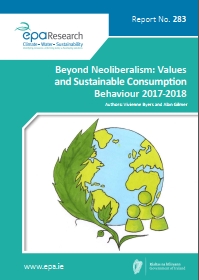Research 283: Beyond Neoliberalism; Values and Sustainable Consumption Behaviour.
Authors: Dr Vivienne Byers and Dr Alan Gilmer
Summary: This desktop research project explores ways to advance understanding of the values and motivations that influence sustainable consumption behaviour in Irish society.

Identify Pressures
The challenges to sustainability and sustainable development have been amplified by the continued growth of the global economy. This research explored ways to gain a better and wider understanding of the values and motivations that influence sustainable consumption behaviour. A key challenge to green governance, sustainability and sustainable consumption is the dominant social paradigm, which can be characterised by a belief in unlimited abundance and progress, materialism, faith in the power of technology, minimal government intervention and unlimited private property rights, which greatly defines our neoliberal discourse. The findings from this research highlight the need for improved governance across all sectors in order to manage sustainable consumption and to recognise the strong link between environmental sustainability and health and well-being. Ultimately, it is important to recognise the interconnected nature of environmental systems and the inevitability of limits to growth.
Inform Policy
Policymakers view the challenges of “green growth” as ways to effectively link individual behavioural change, consumption and economic progress while also addressing the sustainability agenda. However, the findings from this research suggest that large-scale decarbonisation of society can be achieved only if fundamental changes are made to our current consumption patterns and lifestyles. The state utilises a range of policy measures to achieve its policy goals based on defined assumptions regarding individual and collective behaviour, which places a high degree of responsibility on individual action. This study challenges these assumptions as they relate to behaviour, values and governance and offers new insights to inform policy design. This study moves beyond a simplistic approach that addresses discrete elements of human consumption behaviour and seeks to understand their embeddedness within the culture and institutions of wider society and hence inform policy from a new and more insightful context.
Develop Solutions
The outputs of this project present the synthesis of a systematic literature review directed at a new understanding of the challenges of consumption policy, social structures and the boundary arrangements of governance. What emerges is a focus on the institutional and governance (socio-technical) approach. This evidence-based review proposes a new framework or “road map” to guide decision making and aid understanding of what motivates individuals and institutions within a wider neoliberal societal system to manage their consumption from a more sustainable policy and governance perspective. Indeed, a startling revelation of this research is that the rhetoric that places the focus of responsibility for sustainable consumption at the door of the consumer is greatly misplaced. This study suggests that governments and institutions need to acknowledge their role in defining societal values, norms and behaviours and calls for a new approach that recognises the responsibility of leading commercial interests and those empowered to govern in driving sustainability.
https://www.epa.ie/media/archive/research/research-thumbnails/Research_283_Thumbnail.jpg